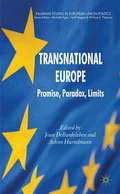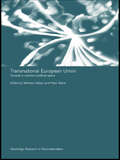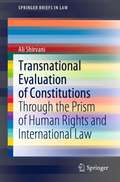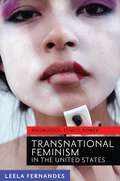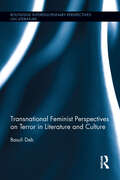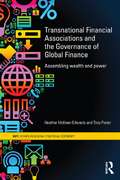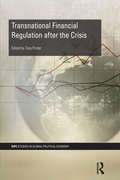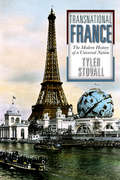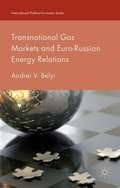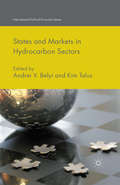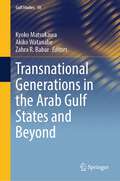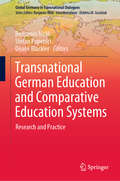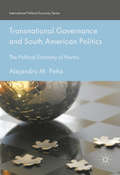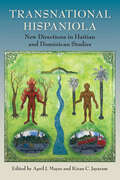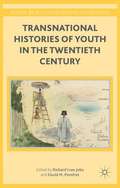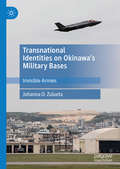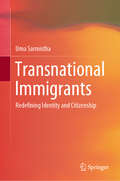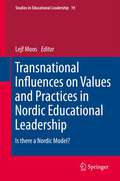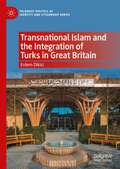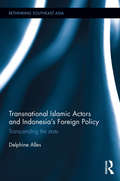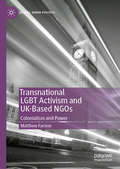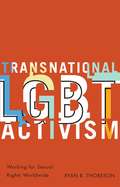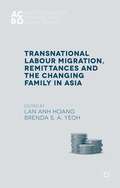- Table View
- List View
Transnational Europe
by Joan DebardelebenTransnational connections are a defining feature of contemporary Europe. They include cross-border economic and cultural exchange, migration, and political activism. This volume probes their political and social significance and makes a case for incorporating transnationalism more systematically into the research agenda of European Studies.
Transnational European Union: Towards a Common Political Space (Routledge Research in Transnationalism #Vol. 19)
by Wolfram Kaiser Peter StarieAt the beginning of the twenty-first century, the European Union is an increasingly dense transnational social and political space. More and more non-governmental organisations develop transnational links, which are usually more intensive within the EU, even if they often extend beyond its borders to the wider world. This multi-disciplinary volume explores the importance of these structures, actors and relations for EU and European governance in the context of the theoretical debate about European integration in the social sciences. This book delivers: theoretical chapters examining and discussing the main conceptual perspectives to studying the transnational EU to provide a current overview empirical case studies of transnationalism in practice on transnational party, trade union and police cooperation to transnational education policy-making and transnational consensus-building in EMU governance. This volume will be of great interest to students in social sciences, contemporary history and law.
Transnational Evaluation of Constitutions: Through the Prism of Human Rights and International Law (SpringerBriefs in Law)
by Ali ShirvaniThis book provides a hypothetical classification of constitutions through international law and human rights values used in any constitution, which draws connections between the inclusive standards of international law and human rights contained in the constitutions. Consequently, an evaluation method will be available for users to rank any constitution potentiality of analysis for grounds of any commitment and responsibility of the states concerning international law and human rights."This important study uses novel quantitative and qualitative methods to explore the relationship between constitutional and international law. It is a significant contribution to the literature, and pushes us further toward rigorous analysis of transnational legal regimes."Tom Ginsburg Professor of Political Science, Chicago Law School.
Transnational Feminism in the United States: Knowledge, Ethics, Power
by Leela FernandesThe acceleration of economic globalization and the rapidglobal flows of people, culture, and information have intensified theimportance of developing transnational understandings of contemporary issues.Transnational feminist perspectives have provided a unique outlook on women’slives and have deepened our understanding of the gendered nature of globalprocesses. Transnational Feminism in theUnited States examines how transnational perspectives shape the ways inwhich we create and disseminate knowledge about the world within the UnitedStates, and how the paradigm of transnational feminism is affected by nationalnarratives and public discourses within the country itself.An innovative theoreticalproject that is both deconstructive and constructive, this bookinterrogates the limits of feministthought, primarily through casestudies that illustrate its power to create new fields of research out oftraditionally interdisciplinary lines of inquiry. Leela Fernandes discussesways to approach, analyze, and capture processes that exceed and unsettle thenation-state within the transnational feminist paradigm. Examining the linksbetween power and knowledge that bind interdisciplinary theory and research, she shines new light on issues suchas human rights as well as academic debates about transnational feministperspectives on global issues. A thought-provoking analysis, Transnational Feminism in the United States powerfullycontributes to the field of Women’sStudies and related cross-disciplinary scholarship on feminist theory andgender from a global perspective.
Transnational Feminist Perspectives on Terror in Literature and Culture (Routledge Interdisciplinary Perspectives on Literature)
by Basuli DebThis book offers a transnational feminist response to the gender politics of torture and terror from the viewpoint of populations of color who have come to be associated with acts of terror. Using the War on Terror in Afghanistan and Iraq, this book revisits other such racialized wars in Palestine, Guatemala, India, Algeria, and South Africa. It draws widely on postcolonial literature, photography, films, music, interdisciplinary arts, media/new media, and activism, joining the larger conversation about human rights by addressing the problem of a pervasive public misunderstanding of terrorism conditioned by a foreign and domestic policy perspective. Deb provides an alternative understanding of terrorism as revolutionary dissent against injustice through a postcolonial/transnational lens. The volume brings counter-terror narratives into dialogue with ideologies of gender, race, ethnicity, nationality, class, and religion, addressing the situation of women as both perpetrators and targets of torture, and the possibilities of a dialogue between feminist and queer politics to confront securitized regimes of torture. This book explores the relationship in which social and cultural texts stand with respect to legacies of colonialism and neo-imperialism in a world of transnational feminist solidarities against postcolonial wars on terror.
Transnational Financial Associations and the Governance of Global Finance: Assembling Wealth and Power (RIPE Series in Global Political Economy)
by Tony Porter Heather McKeen-EdwardsThe role of business in global governance is now widely recognized, but exploration of its role in global financial governance has been more haphazard than systematic. This book provides the first comprehensive analysis of the role of transnational financial associations (TFAs) in the organization of global finance. This book develops three theoretical themes of assemblage, functionality, and power as enrolment. These themes challenge approaches that treat financial power as emanating from a single location or force. Whilst existing approaches tend to treat TFAs as irrelevant or as merely transmitting power originating elsewhere, this book argues that power must be created by painstakingly assembling actors, networks, and objects that are often quite autonomous and working at cross purposes to one another—a process in which TFAs play a central role. The book explores these themes in chapters examining the roles of TFAs in interacting with public authorities, constructing global financial markets, and creating financial communities. The authors additionally analyse the roles of TFAs in the European Union, in the Global South, and in promoting goals other than profitability, including Islamic finance, microfinancing, savings banks and cooperatives. Making a distinctive contribution to our understanding of global finance and global governance, Transnational Financial Associations and the Governance of Global Finance is an important book for students and scholars of international political economy, finance, global governance and international relations.
Transnational Financial Regulation after the Crisis: Transnational Financial Regulation After The Crisis (RIPE Series in Global Political Economy)
by Tony PorterThe global financial crisis that began in 2007 was the most destructive since the 1930s. The rapid spread of the crisis across borders and the complexity of these cross-border linkages highlighted the importance for authorities of working together in responding to the crisis. This book examines the transnational response that relied heavily on a set of relatively informal transnational regulatory groupings that had been constructed over previous decades. During the crisis these arrangements were made stronger and more inclusive, but they remain very complex. Thousands of pages of new rules have been created by various transnational bodies, and the implementation of these rules relies heavily on domestic law and regulation and private rules and practices. This book analyses this complex response, showing that its overly technical and incremental character, the persistence of tensions between transnational processes and state-centred politics, and the ongoing power of private actors, have made the regulatory response fall short of what is needed. Transnational Financial Regulation after the Crisis provides new insights that are relevant for theory and practice, not only for transnational financial regulation, but for global governance more generally.
Transnational France
by Tyler StovallIn this compelling volume, Tyler Stovall takes a transnational approach to the history of modern France, and by doing so draws the reader into a key aspect of France’s political culture: universalism. Beginning with the French Revolution and its aftermath, Stovall traces the definitive establishment of universal manhood suffrage and the abolition of slavery in 1848. Following this critical time in France’s history, Stovall then explores the growth of urban and industrial society, the beginnings of mass immigration, and the creation of a new, republican Empire. This time period gives way to the history of the two world wars, the rise of political movements like Communism and Fascism, and new directions in popular culture. The text concludes with the history of France during the Fourth and Fifth republics, concentrating on decolonization and the rise of postcolonial society and culture. Throughout these major historical events Stovall examines France’s relations with three other areas of the world: Europe, the United States, and France’s colonial empire, which includes a wealth of recent historical studies. By exploring these three areas-and their political, social, and cultural relations with France-the text will provide new insights into both the nature of French identity and the making of the modern world in general.
Transnational France
by Tyler StovallIn this compelling volume, Tyler Stovall takes a transnational approach to the history of modern France, and by doing so draws the reader into a key aspect of France’s political culture: universalism. Beginning with the French Revolution and its aftermath, Stovall traces the definitive establishment of universal manhood suffrage and the abolition of slavery in 1848. Following this critical time in France’s history, Stovall then explores the growth of urban and industrial society, the beginnings of mass immigration, and the creation of a new, republican Empire. This time period gives way to the history of the two world wars, the rise of political movements like Communism and Fascism, and new directions in popular culture. The text concludes with the history of France during the Fourth and Fifth republics, concentrating on decolonization and the rise of postcolonial society and culture. Throughout these major historical events Stovall examines France’s relations with three other areas of the world: Europe, the United States, and France’s colonial empire, which includes a wealth of recent historical studies. By exploring these three areas-and their political, social, and cultural relations with France-the text will provide new insights into both the nature of French identity and the making of the modern world in general.
Transnational Gas Markets and Euro-Russian Energy Relations (International Political Economy Series)
by Andrei V. BelyiThis books analyses how transnational gas markets have evolved and impacted on EU-Russia energy relations. It examines how the political conflict surrounding Ukraine has accelerated a negative interdependence in the region, with energy interdependence increasingly used as an instrument of diplomacy.
Transnational Gas Markets and Euro-Russian Energy Relations (International Political Economy Series)
by Andrei V. BelyiThis books analyses how transnational gas markets have evolved and impacted on EU-Russia energy relations. It examines how the political conflict surrounding Ukraine has accelerated a negative interdependence in the region, with energy interdependence increasingly used as an instrument of diplomacy.
Transnational Generations in the Arab Gulf States and Beyond (Gulf Studies #10)
by Zahra R. Babar Kyoko Matsukawa Akiko WatanabeThis book examines the recent migration phenomenon in the Arab Gulf states for work and residence. It sheds light on the transnationality of diverse groups of migrants from different generations, and unpacks how migrants’ multiple senses of belonging, orientations and adaptive strategies have shaped contemporary migration in the Gulf region. In turn, the analysis presented here shows how the Arab Gulf states’ citizenship and educational policies affect second-generation migrants in particular. Through a series of fine-grained ethnographic case studies, the authors demonstrate the ways in which these second-generation migrants construct their identities in relation to their putative ‘home’ country in the Gulf as well as their complex relationship to their parents’ countries of origin. This is what underpins the deeply transnational character of their lives, choices and notions of belonging. While migration scholars often situate these groups as ‘temporary’, this does not in fact capture the reality of temporariness for the migrants themselves, their children or their dependants. The result is a complex and ongoing construction of identity that shapes the way of life for millions of migrants. Relevant to scholars of migration and international studies, particularly focused on the Middle East, Transnational Generations in the Arab Gulf States and Beyond is also of interest to social scientists researching student mobility in higher education, intergenerational families, identity politics and globalisation.
Transnational German Education and Comparative Education Systems: Research and Practice (Global Germany in Transnational Dialogues)
by Benjamin Nickl Stefan Popenici Deane BlacklerThis book presents an in-depth look at the state of transnational education and comparative perspectives on education systems between Germany and other nation states. It explores how a transnational education identity in secondary and tertiary institutions has developed in the German and other national contexts and which lessons can be learned from current challenges and successes of education systems. It uses detailed case studies to promote critical rethinking of current educational practices in high schools and universities, specifically of race, gender, religion and learner ability in educational settings. It understands learning and teaching as an arena to discuss transnational education opportunities in the 21st century as an emerging or evolving discourse on contemporary forms of transnationalism.
Transnational Governance and South American Politics
by Alejandro M. PeñaThis book examines the interface between transnational private governance and domestic politics in South America. It explores the social and political factors that condition how 'global' private norms, discourses, and initiatives dealing with sustainability and CSR regulation are engaged with, hybridized, and challenged by local actors in Argentina and Brazil. Inverting the conventional approach to global governance studies, it unpacks the complex forms in which domestic political-cultural elements embed global norms and discourses with meaning and mobilizing power, conditioning their appeal to potential participants and supporters. In doing so, the author illuminates the 'receiving side' of private regulation and governance, developing a nuanced understanding of transnational norm diffusion wherein political and ideational factors in the global South are granted primacy over global structures, processes, and agents.
Transnational Hispaniola: New Directions in Haitian and Dominican Studies
by April J. Mayes and Kiran C. JayaramIn addition to sharing the Caribbean island of Hispaniola, Haiti and the Dominican Republic share a complicated and at times painful history. Yet Transnational Hispaniola shows that there is much more to the two nations’ relationship than their perceived antagonism. Rejecting dominant narratives that reinforce opposition between the two sides of the island, contributors to this volume highlight the connections and commonalities that extend across the border, mapping new directions in Haitianist and Dominicanist scholarship. Exploring a variety of topics including European colonialism, migration, citizenship, sex tourism, music, literature, political economy, and art, contributors demonstrate that alternate views of Haitian and Dominican history and identity have existed long before the present day. From a moving section on passport petitions that reveals the familial, friendship, and communal networks across Hispaniola in the nineteenth century to a discussion of the shared music traditions that unite the island today, this volume speaks of an island and people bound together in a myriad of ways. Complete with reflections and advice on teaching a transnational approach to Haitian and Dominican studies, this agenda-setting volume argues that the island of Hispaniola and its inhabitants should be studied in a way that contextualizes differences, historicizes borders, and recognizes cross-island links. Contributors: Paul Austerlitz | Nathalie Bragadir | Raj Chetty | Anne Eller | Kaiama L. Glover | Maja Horn | Regine Jean-Charles | Kiran C. Jayaram | Elizabeth Manley | April Mayes | Elizabeth Russ | Fidel J. Tavárez | Elena Valdez Publication of the paperback edition made possible by a Sustaining the Humanities through the American Rescue Plan grant from the National Endowment for the Humanities. Publication of the paperback edition made possible by a Sustaining the Humanities through the American Rescue Plan grant from the National Endowment for the Humanities.
Transnational Histories Of Youth In The Twentieth Century
by Richard Ivan Jobs David M. PomfretTransnational Histories of Youth in the Twentieth Century examines the emergence of youth and young people as a central historical force in the global history of the twentieth century. Each of the chapters considers the activities of young people from a transnational perspective, emphasizing their agency in the development of global interconnectedness by focusing on a variety of case studies. From backpacking in Europe to political activism in Africa, from Malaysian scouting for girls to Franco-Maghribi music, from Argentine Zionism to the studentled demonstrations in China, the young used a variety of practices and behaviors to engage with the world. This collection is unique in that it analyzes not only the effect of transnationality on youth but also how youth shaped transnationality. It reveals the activities, mobilities, and identities of the young to be a central component of globalization.
Transnational Identities on Okinawa’s Military Bases: Invisible Armies
by Johanna O. ZuluetaThis book considers the role of civilian workers on U.S. bases in Okinawa, Japan and how transnational movements within East Asia during the Occupation period brought foreign workers, mostly from the Philippines, to work on these bases. Decades later, in a seeming “reproduction of base labour”, returnees of both Okinawan and Philippine heritage began occupying jobs on base as United States of Japan (USFJ) employees. The book investigates the role that ethnicity, nationality, and capital play in the lives of these base employees, and at the same time examines how Japanese and Okinawan identity/ies are formed and challenged. It offers a valuable resource for those interested in Japan and Okinawa, U.S. military basing, migration, and mixed ethnicities.
Transnational Immigrants: Redefining Identity and Citizenship
by Uma SarmisthaThis book provides a detailed account of transnational practices undertaken by Indian ‘high-tech’ workers living in the United States. It describes the complexities and challenges of adapting to a new culture while clinging to tradition. Asian-Indians represent a significant part of the professional and ‘high-tech’ workforce in the United States, and the majority are temporary workers, working on contractual jobs (H1-B and L1 work visa category). Further, it is not unusual for Indian immigrant workers to marry and have children while working in the U.S. Gradually, they learn to negotiate the U.S. cultural terrain in both their place of work and at home in the U.S. As such there is the potential that they will become transnational, developing new identities and engaging in cultural and social practices from two different nations: India and the U.S. Against this background, the book describes the nature and extent of transnational practices adopted by high-tech Indian workers employed in the United States on temporary work visas.The study reveals that the temporary stay of these professionals and their families in the U.S. necessitates day-to-day balancing of two cultures in terms of food, clothing, recreation, and daily activities, creating a transnational lifestyle for these young professionals. Transnational activities at the workplace, which are forced by the work culture of the MNCs that employ them, can be considered as ‘transnationalism from above.’ Simultaneously, being bi-lingual at home, cooking and eating Indian and Western food, socializing with Indian and American friends outside work, and all the cultural activities they perform on a day-to-day basis, indicates ‘transnationalism from below’. The book is of interest to researchers and academics working on issues relating to culture, social change, migration and development.
Transnational Influences on Values and Practices in Nordic Educational Leadership
by Lejf MoosThis book explores to what extent transnational influences change national/local values and practices in the Nordic educational systems. It provides country cases and thematic chapters that give nuanced insights into the influence of transnational agencies on national governance and discourses. It describes how national discourses and regulation influences school leadership values, culture and practice, in competition with traditional values. The transnational and global discourse on educational leadership is mostly formed according to Anglo-American thinking and tradition. Pivotal foundations of this discourse are strong hierarchical societies/class societies with liberal democracies, and clearly streamed education systems. The Nordic discourse, however, builds on a more equal society and flat hierarchies with participatory democracy, and on comprehensive schooling with strong local community roots. Leadership thinking and practices are formed by the culture and context they are part of: they are primarily shaped by the national/local values, traditions and practices, and only partially shaped by politics, discourses and literature. Due to the fact that a great deal of the literature that is being used in the Nordic contexts is of Anglo-American origin and many of the research projects have Anglo-American foundations, it is difficult to distinguish the sources for leadership thinking and practice. This book distinguishes the Nordic from the Anglo-American thinking and presents important findings and arguments for leadership practitioners inside as well as outside the Nordic countries.
Transnational Islam and the Integration of Turks in Great Britain (Palgrave Politics of Identity and Citizenship Series)
by Erdem DikiciThis book brings a transnational perspective to the study of immigrant integration in contemporary Western European societies, with a specific focus on transnational Turkish Islam and Turkish integration in Great Britain. It raises significant questions regarding national citizenship models, and offers original insights into the ways in which they can be extended and renewed to cover the cross-border reality.At the theoretical level, Dikici argues that the idea of multiculturalism can be extended to cover immigrant transnationalism without jeopardising its core principles such as equality and recognition of difference, and promises such as a shared national identity and unity in diversity. At the empirical level, the book illustrates that not all transnational Muslim organisations are the same (i.e. militant), and nor do they all hinder Muslim integration, rather they are diverse, with some deliberately contributing to the integration of Muslims into non-Muslim majority societies.The work will be of interest to scholars and students of contemporary integration and citizenship studies, multiculturalism studies, Muslim integration in Western societies, transnationalism and transnational Islam, Civil Society and Diaspora Studies.
Transnational Islamic Actors and Indonesia's Foreign Policy: Transcending the State (Rethinking Southeast Asia)
by Delphine AllesThe past fifteen years have seen Indonesia move away from authoritarianism to a thriving yet imperfect democracy. During this time, the archipelago attracted international attention as the most-populated Muslim-majority country in the world. As religious issues and actors have been increasingly taken into account in the analysis and conduct of international relations, particularly since the 9/11 events, Indonesia’s leaders have adapted to this new context. Taking a socio-historical perspective, this book examines the growing role of transnational Islamic Non-State Actors (NSAs) in post-authoritarian Indonesia and how it has affected the making of Indonesia’s foreign policy since the country embarked on the democratization process in 1998. It returns to the origins of the relationship between Islamic organisations and the Indonesian institutions in order to explain the current interactions between transnational Islamic actors and the country’s official foreign policies. The book considers for the first time the interactions between the "parallel diplomacy" undertaken by Indonesia’s Islamic NSAs and the country’s official foreign policy narrative and actions. It explains the adaptation of the state’s responses, and investigates the outcomes of those responses on the country’s international identity. Combining field-collected data and a theoretical reflexion, it offers a distanced analysis which deepens theoretical approaches on transnational religious actors. Providing original research in Asian Studies, while filling an empirical gap in international relations theory, this book will be of interest to scholars of Indonesian Studies, Islamic Studies, International Relations and Asian Politics.
Transnational Korean Cinema: Cultural Politics, Film Genres, and Digital Technologies
by Dal Yong JinIn Transnational Korean Cinema author Dal Yong Jin explores the interactions of local and global politics, economics, and culture to contextualize the development of Korean cinema and its current place in an era of neoliberal globalization and convergent digital technologies. The book emphasizes the economic and industrial aspects of the story, looking at questions on the interaction of politics and economics, including censorship and public funding, and provides a better view of the big picture by laying bare the relationship between film industries, the global market, and government. Jin also sheds light on the operations and globalization strategies of Korean film industries alongside changing cultural policies in tandem with Hollywood’s continuing influences in order to comprehend the power relations within cultural politics, nationally and globally. This is the first book to offer a full overview of the nascent development of Korean cinema.
Transnational LGBT Activism and UK-Based NGOs: Colonialism and Power (Global Queer Politics)
by Matthew FarmerThis book contributes an analysis of UK-based non-governmental organisations engaged in transnational lesbian, gay, bisexual, and trans (LGBT) activism, within a broader recognition of the complexities that British colonial legacies perpetuate in contemporary international relations. From this analysis, the book suggests that greater engagement with intersectional and decolonial approaches to transnational activism would allow for a more transformative solidarity that challenges the broader impacts of coloniality on LGBT people’s lives globally. Case studies are used to explore UK actors’ participation in the complexities of contemporary transnational LGBT activism, including activist responses to developments in Brunei between 2014 and 2019, and the use of LGBT aid conditionality by Western governments. Activist engagements with legacies of British colonialism are also explored, including a focus on ‘sodomy laws’ and the Commonwealth, as well as the challenges faced by LGBT people seeking asylum in the UK.
Transnational LGBT Activism: Working for Sexual Rights Worldwide
by Ryan R. ThoresonThe International Gay and Lesbian Human Rights Commission (IGLHRC) was founded in 1990 as the first NGO devoted to advancing LGBT human rights worldwide. How, this book asks, is that mission translated into practice? What do transnational LGBT human rights advocates do on a day-to-day basis and for whom? Understanding LGBT human rights claims is impossible, Ryan R. Thoreson contends, without knowing the answers to these questions. In Transnational LGBT Activism, Thoreson argues that the idea of LGBT human rights is not predetermined but instead is defined by international activists who establish what and who qualifies for protection. He shows how IGLHRC formed and evolved, who is engaged in this work, how they conceptualize LGBT human rights, and how they have institutionalized their views at the United Nations and elsewhere. After a full year of in-depth research in New York City and Cape Town, South Africa, Thoreson is able to reconstruct IGLHRC&’s early campaigns and highlight decisive shifts in the organization&’s work from its founding to the present day. Using a number of high-profile campaigns for illustration, he offers insight into why activists have framed particular demands in specific ways and how intergovernmental advocacy shapes the claims that activists ultimately make. The result is a uniquely balanced, empirical response to previous impressionistic and reductive critiques of Western human rights activists—and a clarifying perspective on the nature and practice of global human rights advocacy.
Transnational Labour Migration, Remittances and the Changing Family in Asia
by Lan Anh Hoang Brenda S. A. YeohThe authors investigate the inter-relationships between migrant remittances and the family in Asia. By treating remittances not simply as economic activities but as complex and nuanced transnational processes that embody values and relations transcending national boundaries, they reveal how remittances reconstitute the family structures and relations in which these are embedded. The focus of the research is on 'transient' low-waged labourers whose circular mobility entails unique sets of meanings and expectations. The contributors argue that, in the context of Asian transnational labour migration where remittances tend to become a primary currency of care, the making or breaking of the family unit is essentially contingent on how individuals handle remittance processes. The case studies featured in this edited collection enrich our thinking about migrant remittances as a major driver of social change and at the same time bring up important questions about meanings and purpose of the family in an increasingly mobile world.
